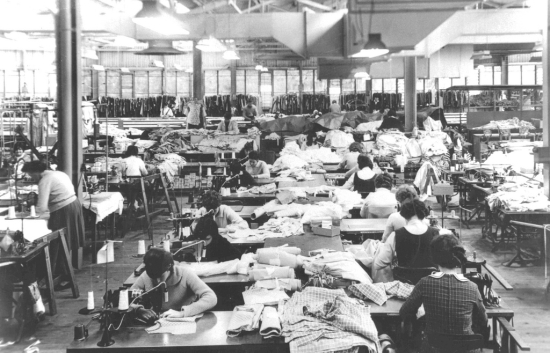It is no secret that the fashion manufacturing industry is not what it once was with more and more care labels reading “Made in China”, Bangladesh and Vietnam. British factories and companies had to close as businesses looked to source mass production overseas for more competitive prices. We have argued that the British manufacturing industry is having a resurgence recently and that this is a more viable option for start up brands and businesses, especially for those located in the UK, that require world class quality and craftsmanship.
This is something that has been discussed in an article by the Business of Fashion asking the question, ‘Does Re-shoring Fashion Manufacturing Make Sense?’ Bringing manufacturing back to Europe and the US can help small scale fashion brands but they wonder is it worth it? – we would of course argue that it is.
The article highlights that ‘today, over 90 percent of US apparel is imported and US apparel manufacturing employs about 135,000 people, according to the Alliance for American Manufacturing. In the UK, the Fashion & Textiles Association (UKFT) puts the figure at about 100,000 people. ‘It is no secret that the industry is not what it was 50 years ago and there is now a huge skills gap that we have discussed in previous blogs. People have lost faith in the UK manufacturing industry but this article suggests that this might be slowly changing.

The article states that ‘last month, Burberry announced plans to invest over £50 million to expand its production in the North of England.’ This is to develop a new manufacturing and weaving facility in Leeds which will bring jobs to over 1,000 people. Other large brands such as Nike are aspiring to do the same and providing mass customisation services based in British factories. They have proved that wide scale UK production is possible given the right backing and confidence in the industry and company in question.
On the one hand, ‘proponents of re-shoring argue companies’ sourcing decisions are more nuanced. They say that factors like rising labour costs in China and fashion companies’ increasing need for speed to market — as well as issues with overseas suppliers like industrial unrest and problems with product quality — are making US and UK manufacturing more attractive.’ For smaller scale production, manufacturing in the UK is ideal as costs are still competitive and it can be done a lot more efficiently. This can be seen with companies such as the sports company, Kukri, moving much of their teamwear production to the UK so that they can react quickly to orders and reduce lead times. This move took place after Kukri were failing to meet delivery dates whilst producing abroad and as a result they lost a lot of contracts in schools and universities. Now under pressure by rival companies based in the UK, they too have now realised the advantages of Made in Britain and the benefits it can bring to their customers.
Companies such as Bridge & Stitch have a database of over 120 factories, all based within the UK, meaning we can easily oversee production and ensure that the quality is up to standard. We advocate working with UK factories and are reaping the benefits with a low carbon foot print, low delivery costs, short lead times and easy communication.

However, there is increasing pressure from clients to lower prices. Furthermore the article quotes, ‘the consensus seems to be that the US and UK won’t see apparel manufacturing growing to anywhere near the levels they enjoyed three decades ago. “There isn’t the manpower here, and there isn’t the workforce nor the factory capacity to have a large-scale resurgence,” says Hertzman.’ That may be so but we know that there is still scope for manufacturing in the UK even if its not necessarily on a mass scale.
They conclude by highlighting that ‘while re-shoring fashion manufacturing might never be a large-scale reality, there are instances where local manufacturing makes sense.’ Sourcing local production and manufacturing is still possible in the UK at competitive prices whilst boasting world class quality that overseas production may not be able to guarantee. We strongly believe that UK production is a unique aspect that a company can use as a selling point and it is something that is increasingly in demand in the industry as the markets improve. So, does re-shoring fashion manufacturing make sense? Of course it does!






